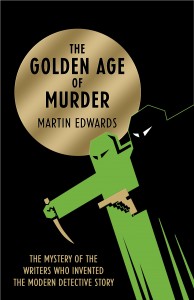The Golden Age of Murder
 Or, to give it its full title, The Golden Age of Murder: The Mystery of the Writers Who Invented the Modern Detective Story, by Martin Edwards. I bought it at Crimefest and starting reading it right away. I finished it in four days even though it is 435 pages long and the days at the convention were packed. It is an enthralling read. There are several strands to the book, skilfully woven together to produce a compelling narrative. The Detection Club, founded around 1930, forms the spine, along with the novels its members wrote, their relationships with each other, and the real life crimes that inspired them. Some would say that the judicial hanging of Edith Thompson after her conviction for being an accessory to the murder of her husband was itself a crime and we are not spared the details, rightly, I think. Certainly it troubled some members of the club and inspired some memorable fiction, such as E. M. Delafield’s Messalina of the Suburbs and F. Tennyson Jesse’s A Pin to See the Peep-Show.
Or, to give it its full title, The Golden Age of Murder: The Mystery of the Writers Who Invented the Modern Detective Story, by Martin Edwards. I bought it at Crimefest and starting reading it right away. I finished it in four days even though it is 435 pages long and the days at the convention were packed. It is an enthralling read. There are several strands to the book, skilfully woven together to produce a compelling narrative. The Detection Club, founded around 1930, forms the spine, along with the novels its members wrote, their relationships with each other, and the real life crimes that inspired them. Some would say that the judicial hanging of Edith Thompson after her conviction for being an accessory to the murder of her husband was itself a crime and we are not spared the details, rightly, I think. Certainly it troubled some members of the club and inspired some memorable fiction, such as E. M. Delafield’s Messalina of the Suburbs and F. Tennyson Jesse’s A Pin to See the Peep-Show.
Agatha Christie comes across as a very sympathetic figure and Dorothy L Sawyers more so than I’d expected. This account of her love for the illegitimate son she felt she could not acknowledge and the failure of her marriage makes sad reading. The members of the Detection Club had their share of human weaknesses. Though none – so far as we know – were actual murderers, unhappy marriages and divorce were common. Authors little read these days – Henry Wade, R. Austin Freeman, M. and G.D.H. Coles and many others – are brought vividly to life. Perhaps the most intriguing figure is Anthony Berkeley who wrote under various names including Francis Iles. Martin claims that ‘the psychological puzzle of the relationship between Berkeley and E. M. Delafield is the great untold story of the Golden Age’ and he makes good on his claim.
Above all it is the voice of the narrator, witty, judicious, humane in his judgements, that makes this book such a pleasure to read. I loved every word, and I confidently predict that in addition to the excellent reviews it has so far garnered (including Mark Lawson’s in the Guardian), that we will be seeing it short-listed for various awards. Bravo!
4 Comments
sarah
June 2, 2015Just reading this at the moment and can echo everything you have said.Definitely one of the best books this year.
Christine Poulson
June 3, 2015I agree. Such a good read.
moira @ Clothes in Books
June 2, 2015Absolutely agree with every word Christine, the book is a triumph, and one that I am so glad I own.
Christine Poulson
June 3, 2015I wish I had written it myself! What more can I say?